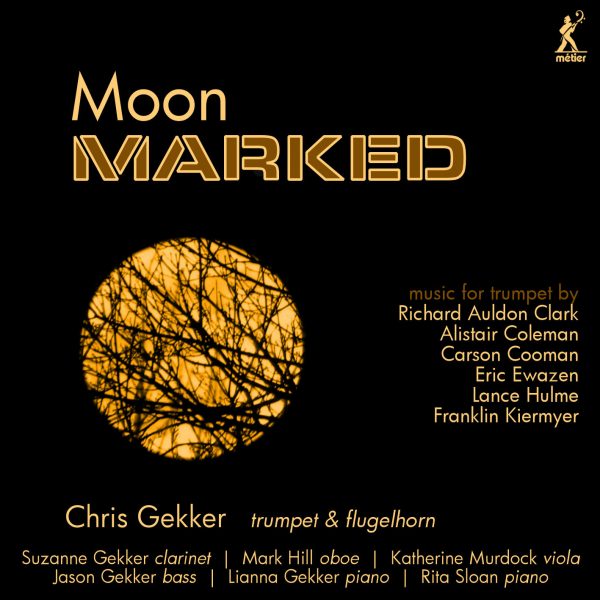Fanfare
There are elements of daring to this disc. A brass disc that concentrates on cantabile and which begins not with trumpet, the lead instrument, but with the plaintive sound of an unaccompanied viola which is then, later, joined by trumpet in Richard Auldon Clark’s … and justice for all? is clearly out to set new patterns. The three voices of trumpet, viola, and double bass eventually join forces in a plea for what is expressed in the title of the piece: justice for all. Clark’s piece is skillfully written both in terms of scoring and also in its careful pacing, allowing the music to animate before putting on the reins. (A moment of hope, perhaps?) Haunting in the extreme, this is a beautiful performance of a beautiful piece. The Divertimento, also by Clark, for the remarkably combination of trumpet, viola, and oboe, reveals a more acidic side to the composer’s harmonic vocabulary in its first movement, while the second seems to speak of loneliness. The distribution of instruments throughout the soundspace seems particularly effective in the central movement before the pecking staccato chords of the finale launch an angular yet playful, even at times comic, romp. All credit is due to the performers for the exactitude of those chords and also for maintaining a sense of fun in studio-bound conditions.
Scored for trumpet and piano only, Lance Hulme’s Elegy for a Sultry Summer Afternoon lives up to its title’s promise, being subtle yet varied in its inclusion of dialogue between the two instruments in its central section. There is more than a hint of laid-back jazz about this. It was, of course, Hulme’s piece Ghost Dialogues that gave a previous Chris Gekker Metier disc its name (see my review in Fanfare 41:2, preferably read in conjunction with James A. Altena’s interview with Gekker; there is also a review there by David DeBoor Canfield). Gekker plays with just a touch of air around the note, presumably a deliberate atmospheric ploy.
Here, the disc takes its name from fellow Fanfare reviewer Carson Cooman’s Moon Marked for trumpet and clarinet. The performance benefits from a slightly closer recording balance. The title refers to the altered perception of place experienced by returning astronauts. There is an element of exploration to Cooman’s materials, but there is grace and humor there, too. The performance, by Chris and Suzanne Gekker, is exemplary, particularly noteworthy in its carefully shaped and calibrated diminuendos. The very close might really only be appreciated by brass players, for it ends on a low trumpet note played quietly—not easy, especially in terms of attack, but Gekker plays it with expert ease.
The highlight of the disc, though, is Eric Ewazen’s Variations and Fugue on a Theme by Brahms for Flugelhorn and Piano, said theme being that of the piano Intermezzo, op. 117/1. The sound of the flugelhorn inevitably reminds me (being born and raised in England’s grim North) of brass bands and the melancholy that they can evoke, an emotional state also aligned with late Brahms. The inspiration for this piece came from Chris Gekker’s father, Paul Gekker, who was a fine amateur pianist, and in whose memory it is written. Ewazen remains true to the spirit of the Brahms original while injecting his own signature. The piece ends with a fugue (it is impossible to miss the beginning); it is fascinating how, as the entries accrue, the music also expands in generosity. Ewazen clearly has an affinity with the music of Brahms, for his Trio pays homage to the Brahms Horn Trio (see my review of the Albany recording in Fanfare 39:6). As the music returns to its opening, the music winds down to a tender farewell.
Taking its inspiration from the poetry of the great Robert Frost, Alistair Coleman’s Acquainted with the Night captures the poem’s mood to perfection. It ends with a quiet, tapping, high piano key. Again, Chris Gekker demonstrates great control, especially of legato, in the lower pitch area.
For Franklin Kiermyer’s Peace on Earth, Chris, Suzanne and Jason Gekker (trumpet, clarinet, and double bass) are joined by Lianna Gekker on piano. A fine jazz pianist (search out her Five in the Afternoon from the University of Maryland, where in fact the present album was also recorded, on YouTube), Lianna Gekker is clearly a talent to watch. Her biography speaks of her “budding independent career”; her playing here is incredibly sensitive to the nuances of the jazz-indebted harmonies. The composer Franklin Kiermyer is also active as a drummer in the field of modern jazz. His Peace on Earth appeared originally on his 1994 album Solomon’s Daughter, where it was performed by Pharoah Sanders, John Esposito, and Drew Gress, and where it is even more horizontal in its laid-back approach than it is with the Gekkers. (That 1994 disc, incidentally, was just reissued to mark its 25th anniversary.) There is something of Harold Budd, perhaps, in the lonely repetition of chord sequences, an aspect one hears more in the Gekkers’ account. This is a lovely, relaxing, and beautiful piece; just listen to the deliciously multifaceted articulation Lianna Gekker accords her solo lines. The two performances are complementary, with that of the Gekkers perhaps maintaining the music at a (small) arm’s length. It is impossible to state a preference; the mood of the listener will surely determine the choice.
This is a most stimulating disc, then, one that encompasses a wide variety of music. Although clearly a showcase for Chris Gekker’s trumpet and flugelhorn playing, it has an overarching feeling of collaboration throughout that lends richness to the whole experience; recommended.
@divineartrecordingsgroup
A First Inversion Company
Registered Office:
176-178 Pontefract Road, Cudworth, Barnsley S72 8BE
+44 1226 596703
Fort Worth, TX 76110
+1.682.233.4978





![🎧 Listen now to the @purcellsingers' first single from their upcoming album, #ASpotlessRose! ➡️ listn.fm/aspotlessrose [in bio]](https://scontent-dfw5-2.cdninstagram.com/v/t51.71878-15/642752592_1424641949105789_8815810652567824072_n.jpg?stp=dst-jpg_e35_tt6&_nc_cat=106&ccb=7-5&_nc_sid=18de74&efg=eyJlZmdfdGFnIjoiQ0xJUFMuYmVzdF9pbWFnZV91cmxnZW4uQzMifQ%3D%3D&_nc_ohc=aY1NGfNpOoYQ7kNvwGPyTsJ&_nc_oc=AdnNiWsyHmrHPNCfhn0i19gRtdTevdLVPz3r9RZLw2kdS6AjZcZt-eqrFtQ2PhhgYKk&_nc_zt=23&_nc_ht=scontent-dfw5-2.cdninstagram.com&edm=ANo9K5cEAAAA&_nc_gid=9jxywe_WC2qQwXSMLZDC8A&_nc_tpa=Q5bMBQGGCGIYjl_Whbi0KwI-NJI83nMOOHloF7WS57HlYvYZPObSyETfPlSsHUa-ofwKE3JGA1-RzO0TPg&oh=00_AfxJTneuDR45b04PuYHuGGPXw-i1rAoFJYdsLgXMTHhYPg&oe=69AF4501)






